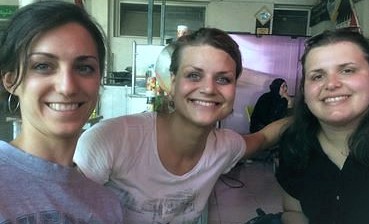With the exception of our national research partner, the composition of our team consists exclusively of women. This detail in combination with the out-going personalities of each of the researchers and personal contacts with Arabic native speakers are well suited to fieldwork and opens our team the doors to both: the world of women and that of men.
Veronika Ritt-Benmimoun (project leader)
Veronika Ritt-Benmimoun is Assistant Professor in Arabic Studies at the University of Vienna, initiator and leader of the TUNOCENT-project. Since 2004 she has worked on the different varieties of Tunisian Arabic, with a focus on the Bedouin-type dialects of southern Tunisia. She has also published two monographs and numerous articles in peer-reviewed journals. Today she is one of the leading specialists for spoken Arabic in the central Maghreb. She has an active command of both Bedouin-type and urban Tunisian Arabic, has done extensive fieldwork, and has well-established contacts in Tunisian society.
Aleksandra Ercegovčević
Aleksandra Ercegovčević is currently enrolled in a PhD programme at the Department of Oriental Studies of the University of Vienna. She has studied Tunisian Arabic for four semesters and has a very good command of it. Her gift and passion for languages (she is fluent in many) and her interest in Arabic dialects makes her an ideal collaborator in this project. In addition to fieldwork and data reviewing Aleksandra will participate in the creation of the TUNOCENT-text corpus and the dialect descriptions.
Ilona Bruckner
Ilona Bruckner holds a BA from the Department of Oriental Studies in Vienna, as well as a BA of her further study of biology. Currently she is enrolled in a MA programme “The Arab World: Language and Society” at the Univiersity of Vienna. During her stay in Tunis, where Ilona started her Research Master degree in Arabic Linguistics, Literature and Islamic Civilisation at the University of Tunis El Manar, she has not only become fluent in Arabic but has also established contacts in various parts of the country. Her main tasks in the project consist of fieldwork and the reviewing of data.
Franziska Schwemmer
Like Ilona Bruckner, Franziska Schwemmer is enrolled in the MA programme “The Arab World: Language and Society”. Having studied Tunisian Arabic at the University of Vienna, as well as on-site, at the University of Tunis El Manar, Franziska has a very good command of the dialect of Tunis. During her Bachelor’s programme, she joined the project TUNICO – Linguistic dynamics in the Greater Tunis Area for technical support. Experienced in fieldwork and qualitative surveys and with a great interest in linguistics she is now involved in the TUNOCENT-investigation. Alongside field research, her main tasks are reviewing, processing and annotating the data.
Zsofia Abraham
Zsofia Abraham is our collaborator in the field of Digital Humanities from the Austrian Centre for Digital Humanities and Cultural Heritage (Austrian Academy of Sciences). Having a dual background in Oriental Studies and software development, she serves as a mediator between researchers’ needs and future-proof digital solutions.
Karlheinz Mörth (national research partner)
Karlheinz Mörth is currently head of the Austrian Centre for Digital Humanities and Cultural Heritage (Austrian Academy of Sciences). From a background in Near Eastern studies, focusing on modern languages and applied linguistics, he has worked on the interface between modern ICT and humanities studies. He has conducted research in text technological fields, with special interests in eLexicography, text lexicography, methodologies for the build-up and maintenance of digital corpora, annotation research, and corpus-related encoding standards. He participated in the project TUNICO – Linguistic dynamics in the Greater Tunis Area and takes an active part in the projects DARIAH – Digital Research Infrastructure for the Arts and Humanities and CLARIN – European Research Infrastructure for Language Resources and Technology.


